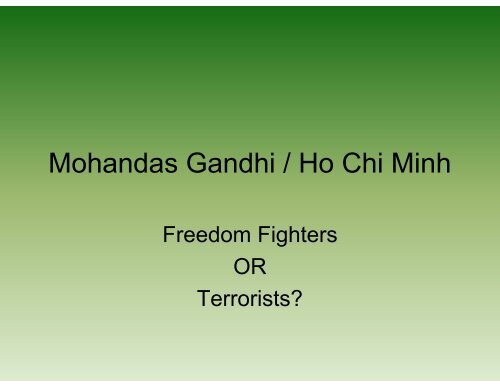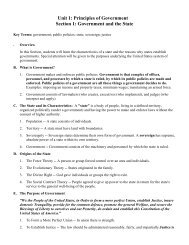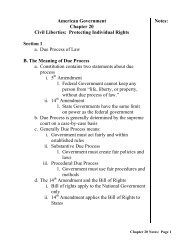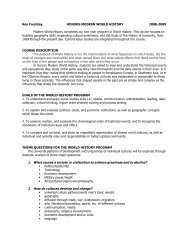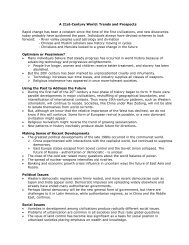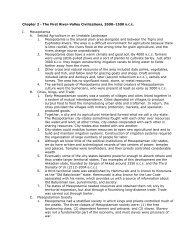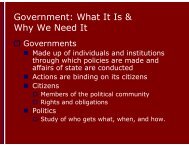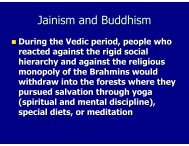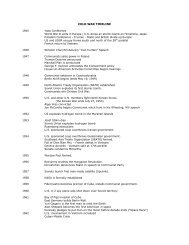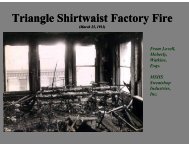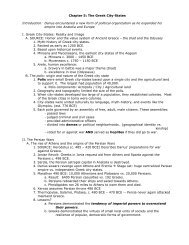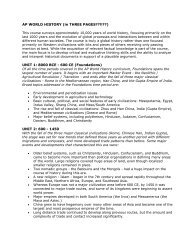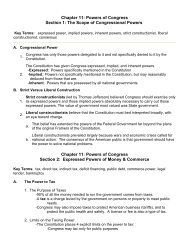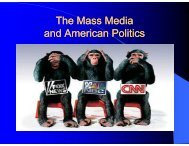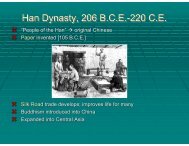Mohandas Gandhi / Ho Chi Minh
Mohandas Gandhi / Ho Chi Minh
Mohandas Gandhi / Ho Chi Minh
You also want an ePaper? Increase the reach of your titles
YUMPU automatically turns print PDFs into web optimized ePapers that Google loves.
<strong>Mohandas</strong> <strong>Gandhi</strong> / <strong>Ho</strong> <strong>Chi</strong> <strong>Minh</strong>Freedom FightersORTerrorists?
<strong>Gandhi</strong>: A Paradox(1869-1948)• Unconventional Politician• A Victorian Moralist in theAge of Great Dictators• Searching for Peace in anera of War and Violence• A Critical Outsider inIndian Society• Religious Leader orSocial Modernizer?
“Generations to come will scarce believe that such aone as this--ever in flesh and blood--walked uponthis earth”Albert Einstein
BRITISH INDIA• Benefits of British rule– Economic progress– Educational opportunities for upperclass– Improvement in public health• Downside of British rule– Genuine freedom missing– Economic progress passed most by– Public health improvements causedpopulation to skyrocket• Formation of Congress Party– Made up moderate Indian professionals
OBSTACLES TO INDEPENDENCE• History of being ruled byoutsiders• Isolation and poverty of ruralpopulation• Caste divisions• <strong>Ho</strong>stility between Hindusand Muslims• Lack of common language• Huge gap between wealthy,western-educated membersof Congress Party andimpoverished anduneducated masses
Chronological BiographyOctober 2, 1869:1888:1892-1915:1919:1922-1925:1930s:March 12, 1930:1932:1942:1945:August 15, 1947:January 30, 1948:• Birth• pursuit of law degree in England• Legal advisor in South Africa• Given the title of Mahatma, or great soul• Imprisoned for sedition• Return to a simple Indian life• Salt March• Fast to protest Hindu-Muslim violence in India• Last call for independence from GB Empire• Deemed the “Father of the Nation” of India• Complete independence achieved• Murdered during his prayer service by a radical
MAHATMA GANDHI• Born in 1869 to a wealthy Hindufamily (2 nd caste)• Received law education in London• While in London, spent spare timestudying spiritual writings– Hindu– Bible– Leo Tolstoy– Henry David Thoreau• Concept of civil disobedience• Moved to South Africa aftergraduation– Developed strategy to help Indiancontract workers• Returned to India in 1916– Welcomed as a hero– Invited to join Congress Party
<strong>Gandhi</strong>’s Philosophy“Christ gave the message, and <strong>Gandhi</strong> gave the method.”– Martin Luther King Jr.No Secrecy:Truth:Trust:Leadership:Power of Change:Martyrdom:“I have no weapon but non-violence.”“Truth is superior to man’s wisdom.”“Trust begets trust.”“I do entertain the hope that there is yet workfor me to do, that the darkness that seems tohave enveloped me will disappear, andthat…India will come to her owndemonstrably through non-violent means.”“You must be the change you wish to see in theworld.”“In this cause, I am prepared to die. But there isno cause in which I am prepared to kill.”
<strong>Gandhi</strong> believed that British imperialismwas wrong and that Indians should refuseto cooperate with the British imperialists.<strong>Ho</strong>wever, he also believed that violencewas wrong. He encouraged his followersto engage in non-violent protests.
<strong>Gandhi</strong> encouraged a policy of non-violentnon-cooperation. By refusing to obey theunjust laws of the imperialists and refusingto buy British products, Indians couldchange the policies of imperialists.As <strong>Gandhi</strong> said, “Real non-cooperation isnon-cooperation with evil and not theevildoer.”
<strong>Gandhi</strong> believed that the use of violencewas always wrong. He believed thatthe only way to change a wrongdoerwas to show the wrongdoer the error ofhis ways. As <strong>Gandhi</strong> said, “An eye foran eye and the whole world is blind.”
<strong>Gandhi</strong> encouragedIndians to boycott orrefuse to buy Britishmadecotton goods orcloth. He encouragedIndians to make theirown homespun cloth.He wanted Indians tosupport the Indianeconomy not the Britisheconomy.
<strong>Gandhi</strong> also urgedIndians to disobeyunjust British laws.The refusal to obeyunjust laws and thewillingness to face theconsequences is calledCivil Disobedience.The making of illegalsalt was an exampleof Civil Disobedience.
<strong>Gandhi</strong>’s vision for change• <strong>Gandhi</strong> spent 2,338 days in jail during his lifetime• Argued to use non-violent resistance (civildisobedience) to achieve change• Satyagraha: principle of “truth-force” which wasthe secret power of non-violence
The British Viceroy’s view(from a meeting with <strong>Gandhi</strong> in 1921)• “There is no hesitation about him and there is a ringof sincerity in all that he utters…his religious viewsare…that non-violence and love will give India itsindependence and enable it to withstand the BritishGovernment”“I must confess that I found it difficult to understandhis practice of them in politics…”
The British taxed salt production inIndia. In 1930, <strong>Gandhi</strong> led the SaltMarch to protest the British salt tax.Indians illegally made salt. Theyrefused to obey thelaw.
The Salt March• March 12 – April 5, 1930• Sabarmati Ashram to Dandi• Distance: 241 Miles• Participants:– 79 official volunteers– 2 miles of Indian citizens
Terrorism in Practice?“With this salt, I am shaking the foundations of the British Empire.”• Addressed the non-interference ofthe British government• Demanded that the Britishgovernment must be “sensitive toworld opinion which will nottolerate repression of extremepolitical agitation which civildisobedience undoubtedly is…”• <strong>Gandhi</strong> was depicted as thegeneral of the great Indian Army
<strong>Gandhi</strong>’s Terrorist Tactics?• Public gatherings• Rallied the masses through his speeches• Performed endless acts of sedition• Openly encouraged Indian citizens to defythe laws of the British government• Made specific demands for change• All done through non-violent resistance
Terrorism in 21 st Century• “<strong>Gandhi</strong> would absolutely oppose al Qaeda and otherterrorists, but he would also oppose some of the wayswe are approaching the war on terrorism.”• “There seem to be no limits now on the war on terrorism.You can crack down on dissent and deny civil liberties.Just label someone a terrorist, and anything goes.”• “For <strong>Gandhi</strong>, violence was not just physical aggression.The nature of violence also could be economic, social,religious, and environmental. In fact, any type ofsuffering that humans cause or humans could prevent,was, to <strong>Gandhi</strong>, a form of violence.”
<strong>Gandhi</strong>’s vision for an independentIndia included justice for all. Hewanted to improve the lives ofuntouchables. He wanted to raisethe standard of living. He wantedall Indians to live together in harmony.
SUCCESS AND DISAPPOINTMENT• British often over-reacted to nonviolentdemonstrations, generatinginternational sympathy for <strong>Gandhi</strong>’scauses• Decades of protest finally paid off in1947 India is grantedindependence• Riots immediately break outbetween Muslims and Hindus• <strong>Gandhi</strong> is assassinated in 1948• Muslim parts of India break off toform Pakistan and Bangladesh
World Impact• Indian independence achieved onAugust 15, 1947• Dozens of European nations liberated theircolonies in <strong>Gandhi</strong>’s example• “The finest lesson we can learn from thephilosophy of <strong>Gandhi</strong> is that, for the individualand the community, policies that make powerthe criterion of truth can only lead to disastrousconsequences.”
<strong>Ho</strong> <strong>Chi</strong> <strong>Minh</strong>“Half Lenin, Half <strong>Gandhi</strong>”
Early Life and Background• <strong>Ho</strong> <strong>Chi</strong> <strong>Minh</strong> (1890-1969) born in CentralVietnam, grew up in simplicity• Father unwilling to compromise with Frenchand lost his job• Father held nationalist beliefs and taught hischildren to oppose French authority• BUT Sent to French school by father• Learned about world by becoming a sailor• Family fully involved in opposition to Frenchauthority
Formulation of Philosophies andBeliefs• Heads abroad, learnsWestern tradition• <strong>Ho</strong> <strong>Chi</strong> <strong>Minh</strong> reads worksof Marx, forms communistideas• Helps form FrenchCommunist Party• Attempted to gain Frenchsympathy• After learning politicalgoals / tactics in his youth,<strong>Minh</strong> encouragesmovement forindependence
Historical Context of French• After years ofindependence, NapoleonIII colonizes Vietnam• Western-styleadministration,Vietnamese bureaucracyloses all power• Economic success ofagriculture at expense ofVietnamese• General opposition to rulegrows, radical groupsform with so muchpovertyVietnamFlag of French Vietnam
The Role of <strong>Ho</strong> <strong>Chi</strong> <strong>Minh</strong>• <strong>Minh</strong> is upset byindifference to situation byWest in the 1920s• France split on issue, <strong>Minh</strong>publishes beliefs in France• While debate wasoccurring, he travels aroundAsia spreading his beliefs,sometimes leading toimprisonment• Founded Vietminh tocoordinate nationalist groupfor independence• Organizes help from<strong>Chi</strong>nese and attempts togain help America
The Vietminh and Opposition to the Japanese –WW II• Japanese move into Vietnam and take control• WW II rages on and Vietnamese help fight theJapanese• After war, Churchill, Roosevelt, and Stalin decideto split Vietnam• <strong>Ho</strong> <strong>Chi</strong> <strong>Minh</strong> declares Vietnam as the“Democratic Republic of Vietnam”, but Frenchimmediately oppose outbreak• War breaks out with French December 1946after lack of agreement between the two parties
• Following the end of World War II, <strong>Ho</strong> <strong>Chi</strong> <strong>Minh</strong>appeals to his nation to rebel against Francebecause they have denied the citizens the sameliberties, prevented a united country and focusedmore on punishment (prisons) than oneducation.• To persuade his countrymen to rebel againstFrance, <strong>Ho</strong> <strong>Chi</strong> <strong>Minh</strong> proclaims, “They havemercilessly massacred our patriots!”
The “French” War and Attempt of UnitingVietnam Under Communism• Nationalists andCommunists support <strong>Ho</strong><strong>Chi</strong> <strong>Minh</strong>’s government• French humiliated, warends in 1954, agreementreached in Geneva• Vietnam divided along17 th parallel• Communist elections innorth, but free elections inSouth• <strong>Ho</strong> <strong>Chi</strong> <strong>Minh</strong> still attemptsto unite whole of Vietnamunder communism17 thparallel


